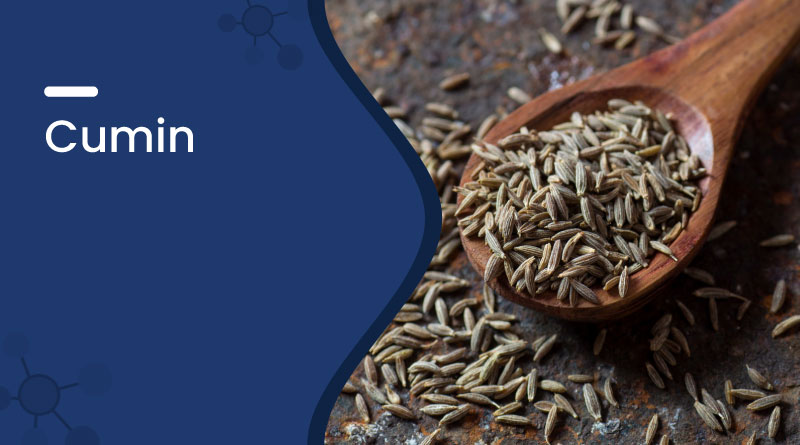Cumin Seeds Benefits & Uses | Healthy Aromatic Spice


Cumin (Cuminum cyminum) is an ancient spice that has been cherished for thousands of years across various cultures for its distinctive flavor and impressive health benefits. Known for its warm, earthy aroma and slightly bitter taste, cumin seeds have been used not only as a culinary staple but also in traditional medicine systems such as Ayurveda and Traditional Chinese Medicine. Often hailed as a digestive aid and natural immunity booster, cumin offers a rich profile of essential oils, antioxidants, vitamins, and minerals that support overall wellness.
In this blog, we will explore cumin’s Ayurvedic significance, nutritional profile, remarkable health benefits, practical uses, precautions, and commonly asked questions.
Nutritional Value of Cumin
| Nutrient | Value per 100g |
|---|---|
| Energy | 375 Kcal |
| Carbohydrates | 44.24 g |
| Proteins | 17.8 g |
| Fat | 22.7 g |
| Dietary Fiber | 10.5 g |
| Folate | 10 µg |
| Niacin | 4.58 mg |
| Pyridoxine | 0.435 mg |
| Riboflavin | 0.32 mg |
| Thiamin | 0.628 mg |
| Vitamin A | 1270 IU |
| Vitamin C | 7.7 mg |
| Vitamin E | 3.3 mg |
| Vitamin K | 5.4 µg |
| Sodium | 1788 mg |
| Potassium | 68 mg |
| Calcium | 931 mg |
| Copper | 0.867 mg |
| Iron | 66.36 mg |
| Magnesium | 366 mg |
| Manganese | 3.3 mg |
| Phosphorous | 499 mg |
| Zinc | 4.8 mg |
| Carotene-ß | 762 µg |
| Lutein-zeaxanthin | 448 µg |
(Source: https://www.lybrate.com/topic/cumin-jeera-benefits-and-side-effects)
Importance of Cumin in Ayurveda
In Ayurveda, cumin is a warming spice that balances Kapha and Vata doshas. It stimulates digestive fire (Agni), improves metabolism, and removes toxins (Ama). Cumin aids appetite, digestion, and nutrient absorption while offering anti-inflammatory and antimicrobial benefits. It’s used in blends to relieve bloating, reduce gas, detoxify the liver, and boost immunity and respiratory health.
Benefits of Cumin
Cumin for Indigestion
Cumin seeds are widely celebrated as a potent digestive aid. They stimulate the secretion of digestive enzymes, bile, and saliva, helping the body break down fats, proteins, and carbohydrates more efficiently. This enhances nutrient absorption and alleviates common digestive issues such as indigestion, bloating, flatulence, and constipation. Its carminative properties soothe the stomach lining and reduce gastric spasms, promoting gut comfort and regular bowel movements.
Cumin for Low Immunity
Rich in antioxidants such as flavonoids and phenols, cumin strengthens the body’s immune defenses by neutralizing harmful free radicals. It also contains antibacterial and antifungal compounds that protect against infections. Regular consumption of cumin helps reduce the frequency and severity of common colds, respiratory infections, and seasonal allergies by enhancing immune resilience.
Cumin for High Blood Sugar
Cumin may help regulate blood sugar levels by improving insulin sensitivity and reducing blood glucose spikes after meals. This makes it a useful natural supplement for individuals with type 2 diabetes or metabolic syndrome to help maintain stable glucose metabolism and prevent complications.
Cumin for Obesity
Cumin supports weight loss by boosting metabolism and promoting fat breakdown. It helps curb appetite, reduce cravings, and increase the body’s ability to burn calories. The spice’s thermogenic effect aids in enhancing energy expenditure, making it a beneficial addition to a balanced diet and exercise regimen for healthy weight control.
Cumin for Respiratory Problems
With anti-inflammatory and antimicrobial properties, cumin is often used to relieve symptoms of asthma, bronchitis, and coughs. It helps loosen mucus, reduce congestion, and soothe irritated airways, improving respiratory comfort and lung function.
Cumin for Anemia and Energy
Due to its exceptionally high iron content, cumin is a natural remedy for iron-deficiency anemia. It promotes the production of red blood cells and increases hemoglobin levels, enhancing oxygen transport throughout the body. This results in reduced fatigue, improved stamina, and better overall energy levels.
Cumin for Skin and Ageing
The antioxidants in cumin combat oxidative stress and protect skin cells from damage caused by UV rays and pollution. Cumin’s antibacterial properties also help treat acne and skin infections. Regular intake supports radiant, youthful skin and slows down the signs of aging.
Cumin for Heart Problems
Cumin’s fiber, potassium, and antioxidant content support cardiovascular health by lowering bad cholesterol (LDL) and regulating blood pressure. It improves blood circulation and prevents plaque formation in arteries, reducing the risk of heart disease and stroke.
How to Use Cumin: Forms, Dosage & Methods
Common Forms of Cumin
- Whole cumin seeds: Used in tempering, seasoning, and herbal teas.
- Ground cumin powder: Added to curries, soups, stews, and spice blends.
- Cumin essential oil: Used in aromatherapy and topical applications (diluted).
- Cumin water (Jeera water): Soaked seeds are boiled or soaked overnight and consumed for digestive and detox benefits.
- Cumin supplements: Available as capsules or extracts.
Usage and Dosage
- For digestion: Consume 1 teaspoon of roasted cumin seeds or cumin powder daily, preferably before or after meals.
- For blood sugar regulation: Drink a glass of warm cumin water made by soaking 1 teaspoon of seeds in water overnight.
- For immunity and respiratory health: Incorporate cumin into daily cooking or drink cumin tea 1–2 times a day.
- For anemia: Combine cumin powder with a source of vitamin C (like lemon juice) to improve iron absorption.
- For weight management: Use cumin regularly in meals and pair with a healthy diet and exercise.
Safety Tips for Using Cumin
- Pregnancy & Breastfeeding: Generally considered safe in culinary amounts; medicinal doses should be taken under medical advice.
- Allergic Reactions: Rare but possible; discontinue use if rash, itching, or swelling occurs.
- Excessive Use: May cause heartburn or digestive upset in sensitive individuals.
- Medication Interactions: Consult a healthcare provider if taking blood thinners or diabetes medication.
- Storage: Keep cumin seeds and powder in airtight containers, away from heat and sunlight to preserve flavor and potency.
Final Thoughts
Cumin is a healthy spice full of nutrients. It helps with digestion, boosts the immune system, and improves metabolism. Adding cumin to your daily diet can support your overall health and protect against common illnesses, based on traditional uses.
Frequently Asked Questions (FAQs)
Q: Can cumin improve digestion?
A: Yes, cumin stimulates digestive enzymes and relieves bloating, gas, and indigestion effectively.
Q: Is cumin safe for diabetics?
A: Absolutely. Cumin helps regulate blood sugar and improve insulin sensitivity naturally.
Q: How do I make cumin water?
A: Soak 1 teaspoon of cumin seeds in a cup of water overnight and drink the strained water in the morning on an empty stomach.
Q: Can cumin cause side effects?
A: When used in normal culinary amounts, cumin is safe. Excessive intake may cause heartburn or allergic reactions in rare cases.
Q: How much cumin should I consume daily?
A: 1–2 teaspoons of cumin seeds or powder per day is considered beneficial and safe for most people.
Recent Blogs
Disclaimer : Zeelab Pharmacy provides health information for knowledge only. Do not self-medicate. Always consult a qualified doctor before starting, stopping, or changing any medicine or treatment.
Related Products
Need Medicines Quick?
Share location to check quick delivery serviceability.
Change Location
Location Access Needed
Your location appears to be blocked or disabled.
Please enable the location from your browser or
device settings.

₹ 0
0
Items added
Quick Links
Categories
Our Policies
2026 Copyright By © Zeelab Pharmacy Private Limited. All Rights Reserved
Our Payment Partners

 Added!
Added!
|
|













